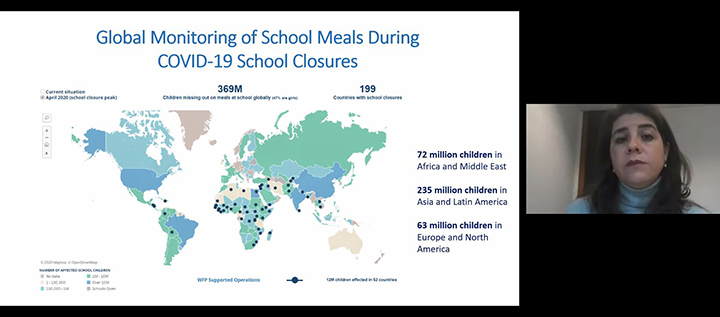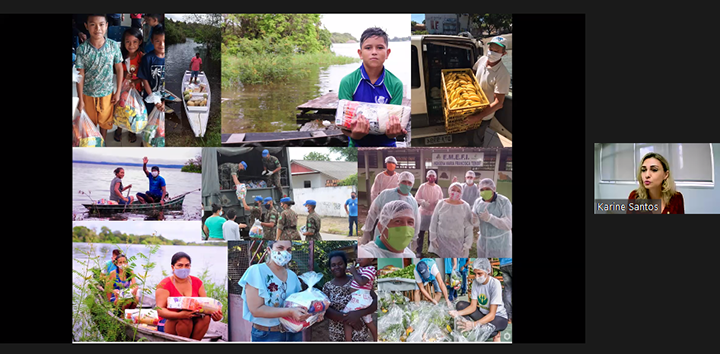
Carmen Burbano, WFP’s School Feeding Director, presents global school feeding figures during the pandemic.
Carmen Burbano, WFP’s Director of School Feeding, and Karine Santos, Coordinator of the Brazilian School Feeding Programme (PNAE), participated in the “School Feeding as a Tool to Fight Hunger” panel, which took place on Tuesday 3rd November as part of the 2020 edition of the Global Child Nutrition Forum (GCNF). The event, which is taking place online for the first time, is a learning exchange and technical assistance conference held annually to support countries in the development and implementation of sustainable school feeding programmes.
In her speech, Karine Santos presented e-PNAE, a mobile application that connects families, students, the academic community, managers and nutritionists, for the exchange of information about school meals. “The app is an example of developments in inspection methods and school community participation in this important public policy, especially when classes are suspended and many students do not have access to meals other than what they were used to get at school,” said Karine.
Karine Santos also gave an overview of school feeding in the country and presented the changes made during the pandemic. PNAE is present in all Brazilian states and serves more than 40 million students enrolled in over 150,000 public schools. The Coordinator explained that, with the arrival of the pandemic, the national school feeding law was amended to allow flexibility in the distribution of food to families while schools remained closed. “These food baskets necessarily needed to follow the program’s guidelines, taking into account the students’ food needs, regional food diversity and prioritizing purchases from family farming,” said Karine.

Karine Santos, PNAE Coordinator, presentes details on how the programme operates in Brazil.
Challenges for school feeding around the globe
Around 90% of children in the world have had their education interrupted due to COVID-19. This means that vulnerable children are missing out not only on education but also on vital services such as nutrition and health. At the height of the crisis, 369 million children were missing out on school meals globally. These are some of the shocking numbers that have been imposing challenges to school feeding programme managers across the globe. The World Food Programme has been working with partners to help them find solutions to alleviate the effects of the crisis and to also plan for the post-pandemic phase.
In her presentation, Carmen Burbano, WFP’s Director of School Feeding, said that that the United Nations have been busy providing analysis and guidance to countries and offices during the pandemic, including sharing publications and documents on how schools can prepare for the post-pandemic phase. The latest of these documents is a white paper about the situation in the education system broadly and the priorities moving forward, including school feeding. Carmen also highlighted that, even with the changes implemented by several countries during the pandemic, a lot of children are still not receiving meals. She also urged countries to use school meal programmes as an incentive to bring children back to school when they reopen.
The panel was moderated by Boitshepo Bibi Giyose, Senior Nutrition Officer at FAO, and featured presentations by Rafael Fabrega, Director of Food for Development at Tetra Laval, and Cindy Long, Deputy Administrator, Child Nutrition Services at the United States Department of Agriculture. Translation from Portuguese into English were provided by the Brazilian Cooperation Agency (ABC).
A recording of the School Feeding as a Tool to Fight Hunger session is available here.
To learn more about the Global Child Nutrition Forum and to register for the remaining sessions, please visit www.gcnf2020.org




